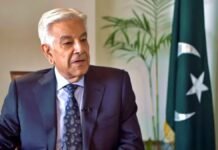
New Delhi: Alexei Navalny, a prominent Russian lawyer, anti-corruption activist, and political prisoner, died on Friday in a remote prison colony in the Arctic region of Russia. His mother was informed of his death by the authorities, who claimed he died of “sudden death syndrome”. His body was not released to his family, pending an investigation.
Who was Alexei Navalny?
Navalny, 47, was one of the most vocal and influential critics of Russian President Vladimir Putin and his ruling party, United Russia. He rose to fame as a blogger and activist, exposing corruption and human rights violations in Russia. He also organized and participated in numerous anti-government protests and ran for various political offices, including the mayor of Moscow in 2013 and the president of Russia in 2018. He was the leader of the Russia of the Future party and the founder of the Anti-Corruption Foundation (FBK).
Navalny was recognized by Amnesty International as a prisoner of conscience and was awarded the Sakharov Prize for his work on human rights. He was also nominated for the Nobel Peace Prize in 2020.
How did Navalny die?
Navalny was serving a three-decade jail sentence in the “Polar Wolf” penal colony in Kharp, about 1,900 km (1,200 miles) northeast of Moscow, for allegedly violating the terms of a suspended sentence for a fraud conviction in 2014, which he and his supporters denounced as politically motivated.
According to a statement by Russia’s federal penitentiary service, Navalny fell and lost consciousness after a walk at the colony on Friday, and could not be revived by medics. He was pronounced dead at 2:17 pm local time (0917 GMT) on February 16.
Navalny’s 69-year-old mother, Lyudmila, visited the colony on Saturday, where she was given an official death notice stating the cause of death as “sudden death syndrome”, a vague and controversial term that can describe any sudden, unexpected death from natural causes.
Navalny’s team said they were also told that his body would not be handed over to them until an investigation was completed. Ivan Zhdanov, the director of Navalny’s FBK, said in an X post: “When Alexei’s lawyer and mother arrived at the colony this morning, they were told that the cause of Navalny’s death was sudden death syndrome.”
What was the reaction to Navalny’s death?
Navalny’s death sparked widespread condemnation and outrage from the international community, especially from Western governments and human rights organizations, who accused Putin and his regime of being responsible for Navalny’s death and demanded an independent and transparent investigation.
Speaking on NPR, White House National Security Advisor Jake Sullivan said the Kremlin’s “long and sordid” history of harming its opponents “raises real and obvious questions about what happened here.” He also said the United States would work with its allies to hold Russia accountable and support the Russian people’s aspirations for democracy and justice.
British Prime Minister Rishi Sunak called Navalny’s death a “terrible news” and a “huge tragedy” for the people of Russia. “As the fiercest advocate for Russian democracy, Alexei Navalny demonstrated incredible courage throughout his life,” Sunak said on X, adding that his “thoughts are with his wife and the people of Russia”.
The European Union’s foreign policy chief, Josep Borrell, said Navalny’s death was “a dark day for Russia and Europe”. He urged the Russian authorities to “ensure a thorough and impartial investigation into the circumstances of his death and to cooperate with the international community in this regard fully”. He also reaffirmed the EU’s commitment to supporting Russian civil society and human rights defenders.
Other world leaders, such as German Chancellor Angela Merkel, French President Emmanuel Macron, Canadian Prime Minister Justin Trudeau, and Australian Prime Minister Scott Morrison, also expressed their condolences and solidarity with Navalny’s family and supporters and called for justice and accountability for his death.
The Kremlin, however, dismissed the Western reaction as unacceptable and “absolutely rabid”. President Putin has not commented on Navalny’s death yet, but his spokesman, Dmitry Peskov, said Navalny’s death was “a regrettable incident” and “a purely medical issue”. He also warned against any “emotional” or “politicized” responses that could harm the relations between Russia and other countries.

What is the legacy of Navalny?
Navalny’s death has left a huge void in the Russian opposition movement, which he had inspired and led for years. His supporters and allies vowed to continue his fight against corruption and authoritarianism in Russia and to honor his memory and legacy.
Navalny’s wife, Yulia, who had been by his side throughout his ordeal, said in an X post: “Alexei was not just my husband, he was my best friend, my partner, my soulmate. He was the love of my life and the father of our two children. He was also a hero for millions of Russians who shared his vision of a free, democratic, and prosperous country. He gave his life for this cause, and I am proud of him. He will always be in my heart and in the hearts of all who loved him.”
Navalny’s death has also raised questions about the future of Russia and its relations with the rest of the world. Some analysts believe that Navalny’s death could trigger a new wave of protests and civil unrest in Russia, as well as more sanctions and pressure from the West. Others argue that Navalny’s death could consolidate Putin’s power and isolate Russia further from the international community.
Whatever the outcome, Navalny’s death has marked a turning point in Russia’s history and has shown the world the courage and sacrifice of a man who dared to challenge the status quo and stand up for his beliefs.















































